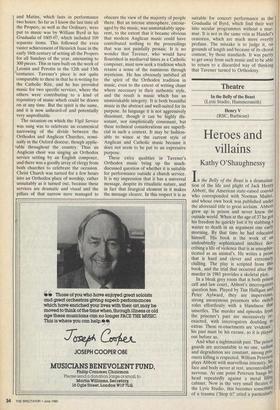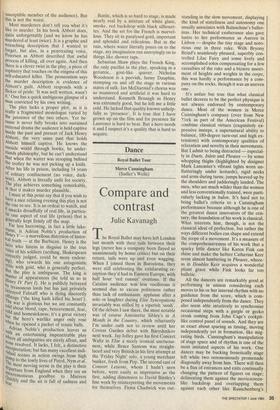Theatre
In the Belly of the Beast (Lyric Studio, Hammersmith)
Henry V (RSC, Barbican)
Heroes and villains
Kathy O'Shaughnessy
In the Belly of the Beast is a dramatisa- tion of the life and plight of Jack Henry Abbott, the American state-raised convict who corresponded with Norman Mailer, and whose own book was published under the aforesaid title to great acclaim. Abbott grew up in prison and never knew the outside world. When at the age of 37 he got his freedom he quickly lost it by stabbing a waiter to death in an argument one early morning. By that time he had educated himself. His book is the work of an undoubtedly sophisticated intellect des- cribing a life of violence that is as unsophis- ticated as an animal's. He writes a prose that is hard and clever and extremely chilling. The play is scripted from this book, and the trial that occurred after the murder in 1981 provides a skeletal plot. In a bleak grey room that is both prison cell and law court, Abbott's interrogators question him. Played by Tim Halligan and Peter Aylward, they are impervious, strong anonymous presences who switch roles effortlessly with a blandness that unsettles. The murder and episodes frog! the prisoner's past are successively re- enacted, with interrogators doubling as extras. These re-enactments are 'evidence,: his past must be his excuse, so it is played out before us.
And what a nightmarish past. The prison guards are accountable to no one, sadism and degradation are constant, among pris- oners killing is respected. William Peterson plays Abbott with marvellous intensity, his face and body never at rest, uncontrollably nervous. At one point Petersen bangs 1W, head repeatedly against a metal filtnk cabinet. Now in the very small theatre. 01 the Lyric Studio, this becomes somettull; of a trauma ('Stop it!' cried a particularly
susceptible member of the audience). But this is not the worst.
Most murderers don't tell you what it's like to murder. In his book Abbott does, quite unforgettably (and we know he has murdered at least twice). It is a graphic and wrenching description that I wanted to forget, but alas, in a penetrating voice, Petersen as Abbott described that awful Process of killing, all over again. And then there is a clever twist in the play, a piece of sophistry that touches on the enigma of this self-educated killer. The prosecution says the murder description is evidence of Abbott's guilt. Abbott responds with a nicker of pride: 'It was well written, wasn't It.' One has a quick ambiguous glimpse of a man convicted by his own writing.
The play lacks a proper plot, as it is really a fragmented monologue varied by the presence of the two others. Yet be- cause it never fully breaks into sustained external drama the audience is held captive inside the past and present of Jack Henry Abbott, the very same past that holds Abbott himself captive. He knows the outside world through books, he under- stands philosophy, but he can't understand that when the waiter was stooping behind the trolley he was not picking up a knife. After his life in prison, including 14 years of solitary confinement (no voice, dark- ness), Abbott is literally unfit for society. The play achieves something remarkable, to that it makes murder plausible.
have must at this point say that if you wish to nave a nice relaxing evening this play is not the one to see. It is an ordeal to watch, and it smacks dreadfully of real life, in particu- lar one aspect of real life (prison) that is generally kept firmly off the map. Par less harrowing, in fact a little luke- warm, is Adrian Noble's production of Henry v— a marvellous distortion of histor- ical truth — at the Barbican. Henry is the hero who listens in disguise to the true voice of his soldiers (nothing, Shakespeare Correctly judged, could be more endear- ing), who rewards his one antagonistic critic with gold, who is generally perfect. But the play is ambiguous. The king is Master of appearances (he told us so in Henryi IV Part 1). He is publicly betrayed offtreasonous lords but has just privately uetrayed Falstaff who is dying discreetly caged (the king hath killed his heart'). The war is glorious but we are constantly told about blood, rape, bereavement, fear, cold and homesickness; it's a great victory but the hero's warlike anger only rose when he opened a packet of tennis balls.
with Noble's production leaves us w th an entertaining impenetrable play where all ambiguities are nicely afloat, and none resolved. It lacks, I felt, a distinctive ,Iterpretation; but has many excellent indi- vidual scenes as action swings from high PI,?mp to the lowly lives of Pistol, Nym et al. most moving scene in the play is their departure from England when they say an t.Teeremonious goodbye to Mistress ‘41llekly and the air is full of sadness and fear.
Battle, which is so hard to stage, is made nearly real by a mixture of white glare, smoke, red backdrop with black silhouet- tes. And the set for the French is marvel- lous. They sit in paralysed gold, important and splendid and ridiculous. But in the rain, where water literally pours on to the stage, my imagination ran annoyingly on to things like shower taps.
Sebastian Shaw plays the French King, the only pacifist in the play, speaking in a geriatric, goat-like quaver. Nicholas Woodeson is a peevish, funny Dauphin, stomping on and off the stage in various states of sulk. Ian McDiarmid's chorus was so mannered and artificial it was hard to understand. Kenneth Branagh as Henry was extremely good, but he left me a little cold. He lacked that quality known unhelp- fully as 'presence'. It is true that I have grown up on the film and for presence Sir Laurence is hard to beat. But a hero needs it and I suspect it's a quality that is hard to acquire.



















































 Previous page
Previous page